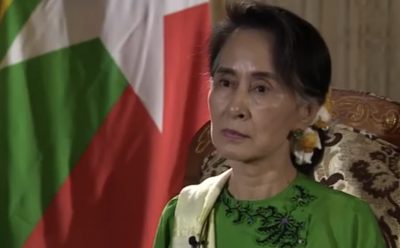Myanmar seeks dialogue with the United Nations Special Envoy: Non-Muslim voices
Sawako Utsumi and Lee Jay Walker
Modern Tokyo Times

The United Nations Special Envoy to Myanmar, Christine Schraner Burgener, recently revisited this multi-ethnic and multi-religious country. Of course, State Counsellor Daw Aung San Suu Kyi fully understands the need to build bridges of trust – but unlike the Western and Islamic media nuance – it was the United Nations (UN) that wasn’t open to genuine dialogue. Instead, the UN, like many Western and Islamic nations, seemed more intent on taking an anti-indigenous approach to Rakhine and dictating to Myanmar.
However, in truth, all the other ethnic groups in Rakhine fear the Bengali Muslim legacy of the British and endless migration since the demise of the British Empire, and which began to gather in pace since the independence of Bangladesh. At the same time, Islamic militants and ordinary Bengali Muslims even turned against Bengali Hindus because several massacres of Hindus took place after ARSA (Arakan Rohingya Salvation Army) launched attacks against Myanmar in Rakhine. Indeed, Bengali Hindus who fled the violence in Rakhine even need to be protected in camps in Bangladesh because of threats made by Bengali Muslims despite being a small minority.
The treatment of Hindus by ARSA and the situation in Bangladesh where Bengali Hindus from Rakhine need protecting despite being such a small minority, mirrors the reality that all non-Bengali Muslims face in Rakhine. This applies to areas where major demographic changes have taken place. Thereby, leaving minority ethnic and religious groups in Bengali Muslims majority held areas residing in fear and apprehension.
AFP (France 24) reported last year about the Mro fleeing ARSA terrorism, “San Tun said many of his Mro people — who number between 20,000 and 40,000 — had to leave everything behind as they sought sanctuary in government-held areas…”
Similarly, the BBC stipulates about one massacre committed by ARSA in accordance with a report by Amnesty International. This media source says, “In this brutal and senseless act, members of ARSA captured scores of Hindu women, men and children and terrorized them before slaughtering them outside their own villages.”
Other minorities, including small and minor groups including the Daing-net, Mramagyi, and Thet have been forced to flee to government-held areas because of Bengali Muslim militancy that breathes through the hatred of ARSA. At the same time, indigenous Rakhine Buddhists fear the rising tide of Islamist hatred and the Bengali Muslim land grab that is being replicated in the Chittagong Hill Tracts in Bangladesh and in Assam in India. Hence, how is it that all other groups in Rakhine including Bengali Hindus, just like in the Chittagong Hill Tracts, fear Bengali Muslims and the terrorist group ARSA?
The situation in Rakhine is extremely complicated and the same applies to the challenges faced by the highly respected Aung San Suu Kyi. Hence, Burgener needs to focus on the angle highlighted and look at the other dimension that is neglected by the international media. Likewise, Burgener needs to view the complex ethnic and religious dimension that exists in other parts of Myanmar; and analyze the democratic path being taken by Aung San Suu Kyi alongside economic and infrastructural developments.
The Myanmar Times reports about the recent visit of Burgener to Rakhine. This media source stipulates, “U Chit Myo Oo, an official of Maungdaw township, said Schraner Burgener also met refugees from Muslim and Hindu communities who fled to Bangladesh and returned on their own to Shwe Zar village during her visit to Maungdaw.”
After Burgener’s recent visit to Myanmar, the UN website says the Special Envoy to Myanmar is “Appreciating the willingness of the Myanmar authorities to engage with her closely, she will continue to focus her efforts on strengthening engagement between Myanmar and the international community towards a more tolerant, democratic and inclusive society that recognizes diversity as an asset.”
It is imperative on the government of Myanmar and the armed forces of this nation to seek a fresh start with the Special Envoy to Myanmar based on the need to build bridges. Of course, the ball is in the court of Burgener because for all too long the anti-Myanmar nuance was peddled. Naturally, this only led to a breakdown in relations between Myanmar and the UN. Equally alarming, it benefitted the anti-Myanmar agenda and made matters worse for politicians in this nation that seek to entrench democracy and galvanize the economy.
Of course, differences will occur but if both sides listen to each other – instead of dictating to Myanmar and focusing on a false narrative then bridges can be built. Nobody is pretending that the road ahead will be easy but the non-Muslim voice in Rakhine must be heard – and the historical legacy must not be ignored. Overall, it is hoped that Burgener will listen to the government of Myanmar and all interested parties – if so, then Myanmar will benefit because the hostile approach is detrimental to the indigenous of Rakhine and the false narrative is hindering the economy.
https://www.mmtimes.com/news/un-envoy-meets-officials-csos-kachin.html

Modern Tokyo News is part of the Modern Tokyo Times group
DONATIONS to SUPPORT MODERN TOKYO TIMES – please pay PayPal and DONATE to sawakoart@gmail.com
http://moderntokyotimes.com Modern Tokyo Times – International News and Japan News
http://sawakoart.com – Sawako Utsumi personal website and Modern Tokyo Times artist
https://moderntokyonews.com Modern Tokyo News – Tokyo News and International News
http://global-security-news.com Global Security News – Geopolitics and Terrorism
PLEASE JOIN ON TWITTER
https://twitter.com/MTT_News Modern Tokyo Times
PLEASE JOIN ON FACEBOOK
https://www.facebook.com/moderntokyotimes